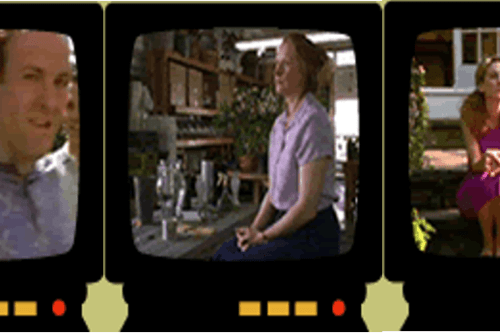The “F Word”
Given this portrayal, is Sex and the City feminist? While HBO should be lauded for presenting women characters who are more complex, over the age of 30, career-oriented, and not solely wives or mothers, there are some problematic representations that should be addressed. First, feminism seems to be a dirty word. Even though HBO is no stranger to “strong” language, this one appears to be on the “do not use” list. While Carrie, Samantha, Miranda, and sometimes Charlotte, act in ways that are decidedly feminist (e.g., Miranda’s resistance to the demands of work and motherhood or Samantha’s refusal to let her sexual experiences be viewed differently from men’s), rarely, if ever, are the women or their actions labeled as feminist. When a show avoids using the word feminist—seemingly because of its still-stigmatized connotations in the age of postfeminism—it is difficult to interpret the show as such. In the episode discussed here, “Time and Punishment,” Charlotte employs liberal feminism to defend her decision without using the “f-word.” Sex and the City fails to escape the cultural trap of ambivalence toward women, their identities, and feminism. In this sense, Sex and the City is a reflection of the culture—and may in fact be more realistic than other shows that firmly locate women as either feminine or feminist (and thus masculine). Without being explicitly feminist, Sex and the City still promotes feminist themes and provides four independent women characters space to be like real women—fallible, complicated, good, bad, and diverse. Furthermore, by having only one Charlotte, only one of the four main characters who is interested and focused on marriage and motherhood, and by giving her a long, hard road to travel in her journey to realize those ambitions, Sex and the City privileges women’s independence rather than dependence on men—something that has rarely been seen on network television.
Works Cited
Clemetson, Lynette, et al. “Doing It All? Young Feminists Take On Work, Family, and the Meaning of Success: A Panel Discussion.” Scholar and Feminist Online 2.3 (2004), http://www.barnard.edu/sfonline/family/panel_01.htm.
Douglas, Susan. Where the Girls Are: Growing Up Female with the Mass Media. New York: Times Books, 1994.
Dow, Bonnie J. Prime-time feminism: Television, media culture, and the women’s movement since 1970. Philadelphia: University of Pennsylvania Press, 1996.
Hochschild, Arlie. “The Commercial Spirit of Intimate Life and the Abduction of Feminism: Signs from Women’s Advice Books.” Theory, Culture, and Society 11 (1994): 1–24.
Hoffnung, Michele. “The Motherhood Mystique.” In Shifting the Center: Understanding Contemporary Families, edited by Susan J. Ferguson, 277–91. Mountain View, CA: Mayfield, 1998.
hooks, bell. Where We Stand: Class Matters. New York: Routledge, 2000.
Jaggar, Alison M. Feminist Politics and Human Nature. Totowa, NJ: Rowman and Allanheld, 1983.
Sex and the City. Created by Darren Star. HBO. 1998–2004.
Stinson, Kandi. Women and Dieting Culture: Inside a Commercial Weight Loss Group. New Brunswick, NJ: Rutgers University Press, 2001.
Tong, Rosemarie. Feminist Thought: A Comprehensive Introduction. Boulder, CO: Westview, 1989.


